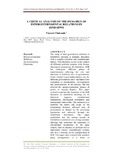Please use this identifier to cite or link to this item:
https://cris.library.msu.ac.zw//handle/11408/3798Full metadata record
| DC Field | Value | Language |
|---|---|---|
| dc.contributor.author | Chakunda, Vincent | - |
| dc.date.accessioned | 2020-07-20T08:14:46Z | - |
| dc.date.available | 2020-07-20T08:14:46Z | - |
| dc.date.issued | 2018 | - |
| dc.identifier.uri | https://pdfs.semanticscholar.org/e2b5/ef6a7300e13dc95afd582898c23c79a366ca.pdf?_ga=2.3477752.973781276.1594988172-2093234464.1594126985 | - |
| dc.identifier.uri | https://www.longdom.org/open-access/a-critical-analysis-of-the-dynamics-of-intergovernmental-relations-in-zimbabwe-2332-0761-1000326.pdf | - |
| dc.identifier.uri | http://hdl.handle.net/11408/3798 | - |
| dc.description.abstract | The study of inter-government relations in Zimbabwe presents a dynamic discourse with a complex political and constitutional history. This discourse occurs in the context of different political systems with diverse ideological orientations. In Zimbabwe, IGR has undergone different phases of transformation affecting the role and functions of different tiers of government. From colonial to post- independence era, the different governments have vacillated from centralism to decentralism, overregulation and protectionism. In the process, this has affected the intergovernmental balance of power in varying degrees. This paper critically examines the dynamics of the IGR discourse in Zimbabwe dwelling on its historical legacies, constitutional foundations, ideological orientation and institutional frameworks. The endeavor is to establish the nature and scope of the relationship between different tiers of government as shaped by the governing legislation and enforced through the established institutions. The paper established that the unitary system of Zimbabwe is anchored on a strong centralist ideology that suffocates the autonomy of sub-national institutions. In the same context, there is absence of political will to implement crucial constitutional reforms that have a bearing on the configuration of IGR. The paper also revealed that political party incongruence is a threat to intergovernmental coordination, integrated planning and collaborative development in Zimbabwe. | en_US |
| dc.language.iso | en | en_US |
| dc.relation.ispartofseries | Journal of Asian and African Social Science and Humanities;Vol. 4; No. 2: p. 14-27 | - |
| dc.subject | Intergovernmental relations | en_US |
| dc.subject | Constitutional history | en_US |
| dc.subject | Centralism | en_US |
| dc.subject | Decentralism | en_US |
| dc.subject | Zimbabwe | en_US |
| dc.title | A critical analysis of the dynamics of intergovernmental relations in Zimbabwe | en_US |
| dc.type | Article | en_US |
| item.cerifentitytype | Publications | - |
| item.grantfulltext | open | - |
| item.fulltext | With Fulltext | - |
| item.openairetype | Article | - |
| item.openairecristype | http://purl.org/coar/resource_type/c_18cf | - |
| item.languageiso639-1 | en | - |
| Appears in Collections: | Research Papers | |
Files in This Item:
| File | Description | Size | Format | |
|---|---|---|---|---|
| intergovernmental relations.pdf | Abstract | 194.61 kB | Adobe PDF |  View/Open |
Page view(s)
156
checked on Apr 18, 2025
Download(s)
62
checked on Apr 18, 2025
Google ScholarTM
Check
Items in MSUIR are protected by copyright, with all rights reserved, unless otherwise indicated.



